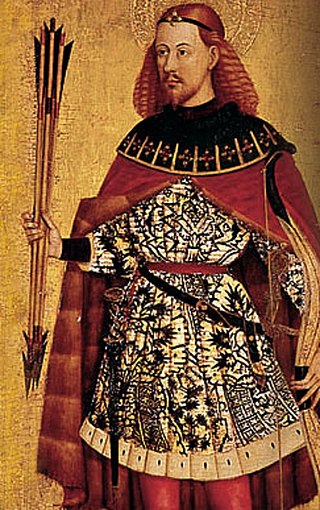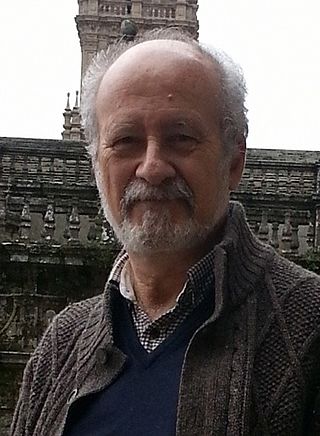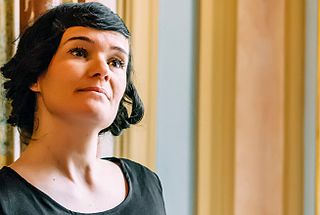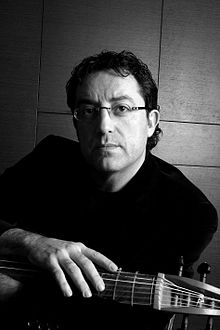
Ausiàs March was a medieval Valencian poet and knight from Gandia, Valencia. He is considered one of the most important poets of the "Golden Century" of Catalan/Valencian literature.

Carles Puyol Saforcada is a Spanish former professional footballer who played his entire career for Barcelona. He mainly played as a centre-back, but he could also play in either full-back position, mostly as a right-back.

Juan del Encina was a composer, poet, priest, and playwright, often credited as the joint-father of Spanish drama, alongside Gil Vicente. His birth name was Juan de Fermoselle. He spelled his name Enzina, but this is not a significant difference; it is two spellings of the same sound, in a time when "correct spelling" as we know it barely existed.
Tomás Marco Aragón is a Spanish composer and writer on music.
Salvador Ibáñez (1854–1920) was a Spanish luthier. He made guitars, ukuleles, mandolins and other stringed instruments. These instruments were prized for their excellent quality and impeccable workmanship.
Juan José Colomer is a Spanish composer.
August Wenzinger (1905–1996) was a prominent cellist, viol player, conductor, teacher, and music scholar from Basel, Switzerland. He was a pioneer of historically informed performance, both as a master of the viola da gamba and as a conductor of Baroque orchestral music and operas.

The Cancionero de Palacio, or Cancionero Musical de Palacio (CMP), also known as Cancionero de Barbieri, is a Spanish manuscript of Renaissance music. The works in it were compiled during a time span of around 40 years, from the mid-1470s until the beginning of the 16th century, approximately coinciding with the reign of the Catholic Monarchs.
Joan Brudieu was a Catalan Spanish composer. Brudieu was born around 1520 in the diocese of Limoges and died in la Seu d'Urgell in 1591, but can generally be considered as Catalan, since the few biographical details found locate him in Catalonia.
Victoria Musicae is a Spanish early music group based in Valencia, Spain.
Capella de Ministrers is an early music group formed in 1987 in Valencia, Spain by Carles Magraner. Valencian music is prominent in its repertoire.
Juan Cornago was a Spanish composer of the early Renaissance.
Jeff Hamburg is an American composer. Born in Philadelphia, he studied acoustics and composition at the University of Illinois and moved to the Netherlands in 1978 to continue his studies at the Royal Conservatory of The Hague with Louis Andriessen. In 1986, he received the Conservatory Prize. He further studied French Horn at the Royal Conservatory and later conducted classes with David Porcelijn at the Conservatory of Utrecht.
Juan de Triana was a Spanish composer of the Renaissance period, active in the second half of the 15th century during the reign of the Catholic Monarchs. Pope Sixtus IV issued a bull on 9 February 1478 that listed De Triana as Prebendary of the Cathedral of Sevilla for at least a year before. He later moved to the Cathedral of Toledo, where it was recorded that in 1483 he was a teacher of six children in the Cathedral, with a salary of 18,000 maravedíes, a significant quantity at the time. Possibly Triana held this position until 1490, when he was replaced by Pedro de Lagarto. He died in Seville on 28 January 1494, and was buried near the gate of the chapel of the Virgen de la Antigua. In his will, he left a bequest to endow a chaplaincy to sing twenty-five masses a month for his soul at the altar of San Juan Bautista, near his place of burial.

José Luis Turina is a Spanish composer, grandson of Joaquín Turina.
Bartomeu Càrceres, Bartolomé Cárceres in castillian, was a Spanish composer, notably of ensaladas.

Mara Aranda is a Spanish singer. She is known for rediscovering and reviving the musical heritage of Sephardic Jews.
The Cancionero de Segovia or Cancionero Musical de Segovia (CMS), also known as Cancionero of the Segovia Cathedral, is a manuscript containing Renaissance music from the end of the 15th century and beginning of the 16th century. It contains a wide repertoire of works by mainly Spanish, French and Franco-Flemish composers. It is kept at the Segovia Cathedral Archives.

Carles Aleñá Castillo is a Spanish professional footballer who plays as a central midfielder for La Liga club Getafe.







